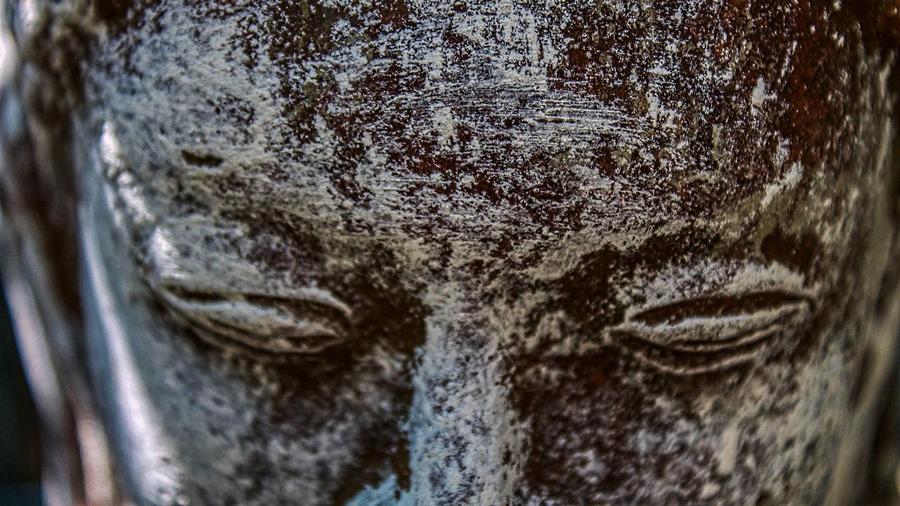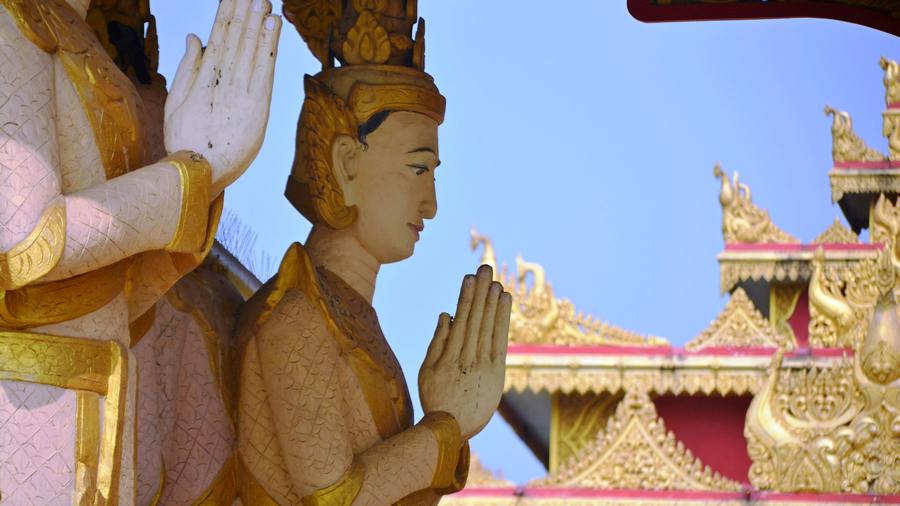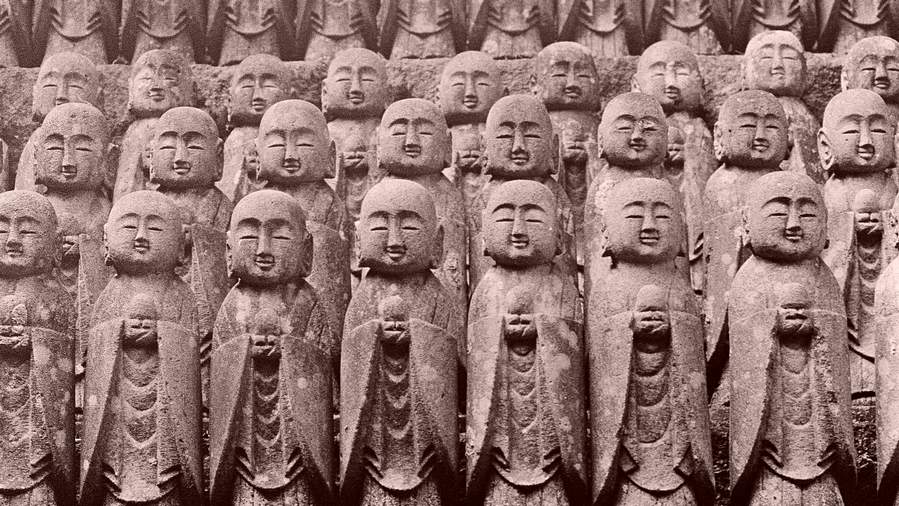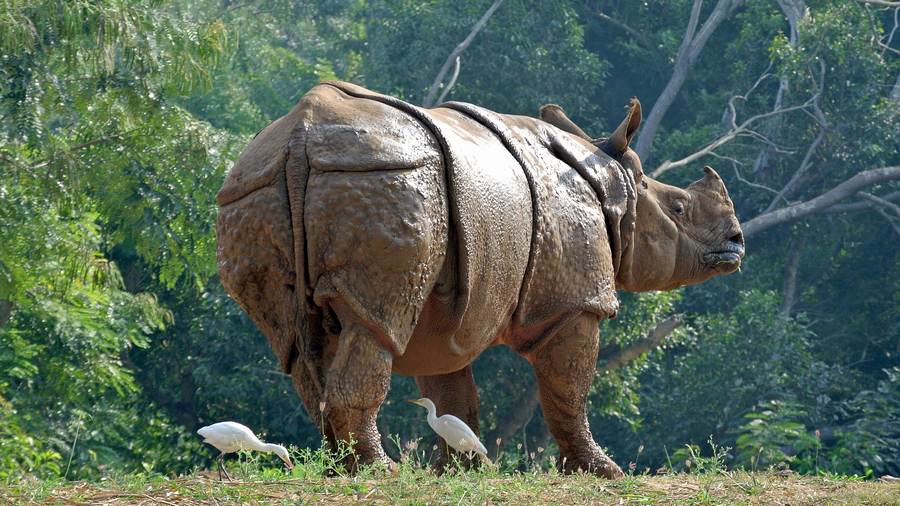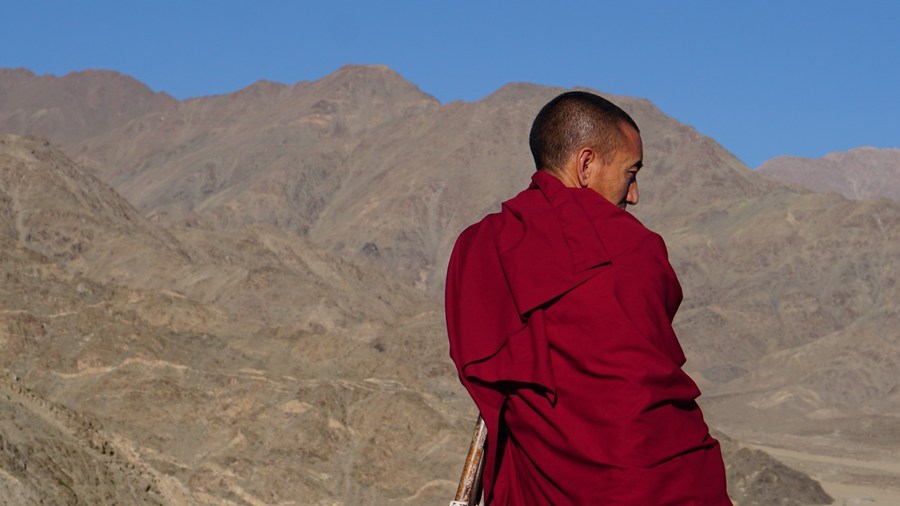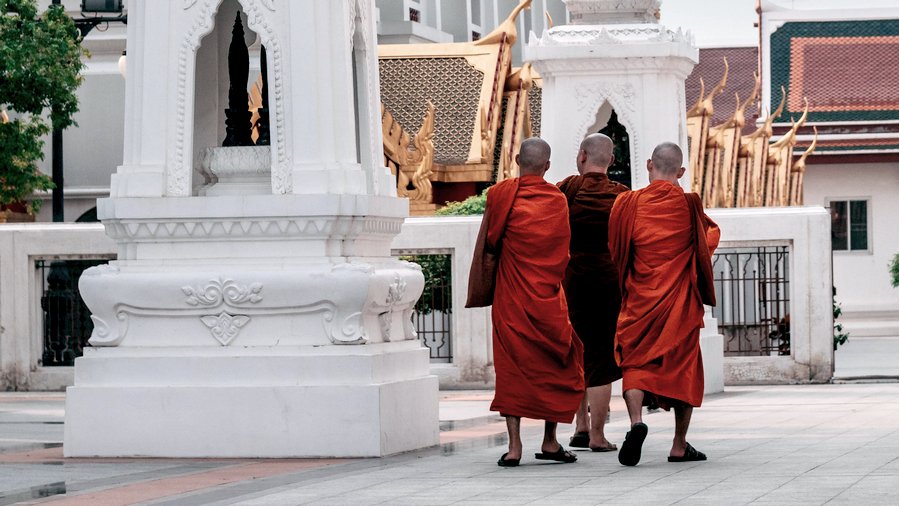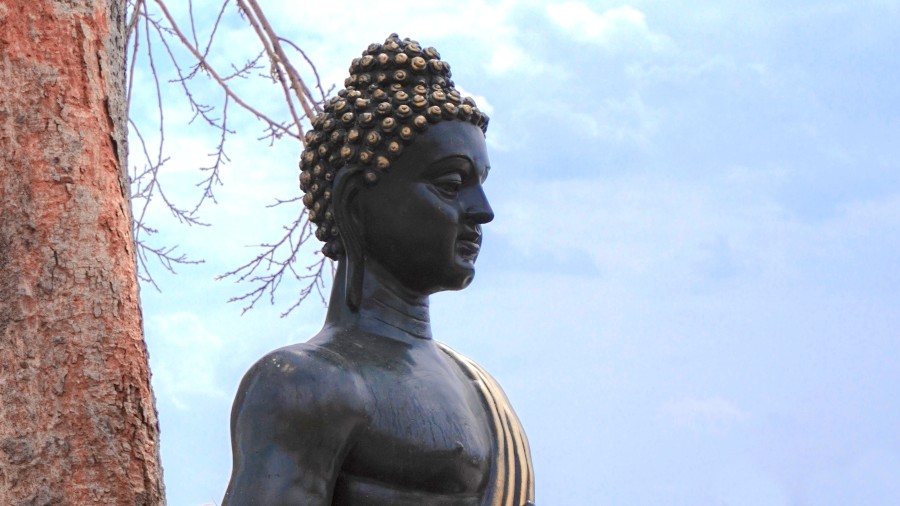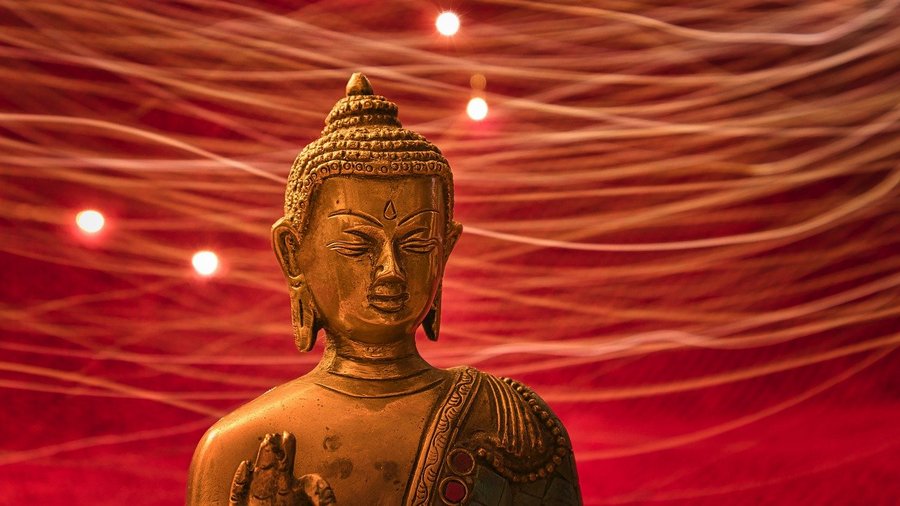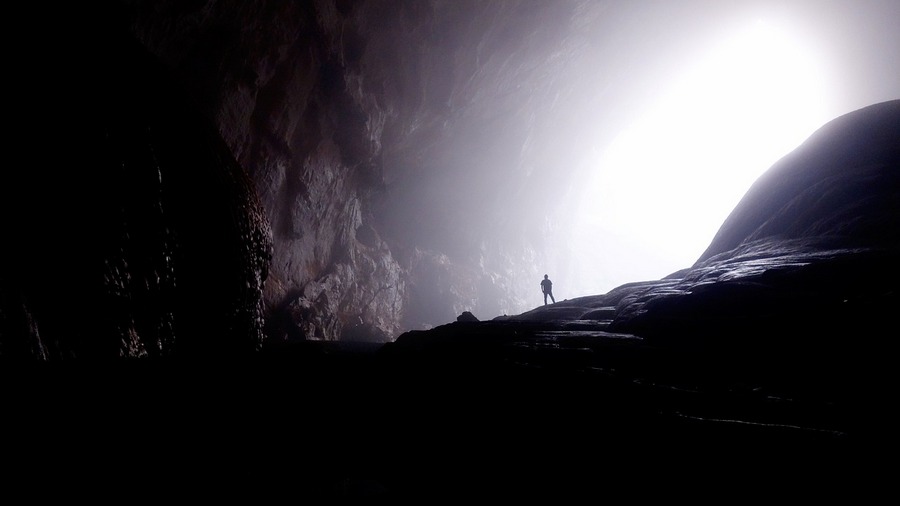[Note: Today’s selection is quite long, but it is an interesting presentation of conditionality. We will return to shorter selections tomorrow.]
So I have heard. At one time the Buddha was staying near Sāvatthī in the stilt longhouse of Migāra’s mother in the Eastern Monastery. Now, at that time it was the sabbath—the full moon on the fifteenth day—and the Buddha was sitting in the open surrounded by the Saṅgha of monks. Then the Buddha looked around the Saṅgha of mendicants, who were so very silent. He addressed them:
“Suppose, mendicants, they questioned you thus: ‘There are skillful teachings that are noble, emancipating, and lead to awakening. What is the real reason for listening to such teachings?’ You should answer: ‘Only so as to truly know the pairs of teachings.’ And what pairs do they speak of?
‘This is suffering; this is the origin of suffering’: this is the first contemplation. ‘This is the cessation of suffering; this is the practice that leads to the cessation of suffering’: this is the second contemplation. When a mendicant meditates rightly contemplating a pair of teachings in this way—diligent, keen, and resolute—they can expect one of two results: enlightenment in this very life, or if there’s something left over, non-return.”
That is what the Buddha said. Then the Holy One, the Teacher, went on to say:
“There are those who don’t understand suffering
and suffering’s cause,
and where all suffering
ceases with nothing left over.
And they do not know the path
that leads to the stilling of suffering.
They lack the heart’s release,
as well as the release by wisdom.
Unable to make an end,
they continue to be reborn and grow old.
But there are those who understand suffering
and suffering’s cause,
and where all suffering
ceases with nothing left over.
And they understand the path
that leads to the stilling of suffering.
They’re endowed with the heart’s release,
as well as the release by wisdom.
Able to make an end,
they don’t continue to be reborn and grow old.”
“Suppose, mendicants, they questioned you thus: ‘Could there be another way to contemplate the pairs?’ You should say, ‘There could.’ And how could there be? ‘All the suffering that originates is caused by attachment’: this is one contemplation. ‘With the utter cessation of attachment there is no origination of suffering’: this is the second contemplation. When a mendicant meditates in this way they can expect enlightenment or non-return.” Then the Teacher went on to say:
“Attachment is the source of suffering
in all its countless forms in the world.
When an ignorant person builds up attachments,
that dullard returns to suffering again and again.
So let one who understands
not build up attachments,
contemplating the origin of suffering and rebirth.”
“Suppose, mendicants, they questioned you thus: ‘Could there be another way to contemplate the pairs?’ You should say, ‘There could.’ And how could there be? ‘All the suffering that originates is caused by ignorance’: this is one contemplation. ‘With the utter cessation of ignorance there is no origination of suffering’: this is the second contemplation. When a mendicant meditates in this way they can expect enlightenment or non-return.” Then the Teacher went on to say:
“Those who journey again and again,
transmigrating through birth and death;
they go from this state to another,
that destination due only to ignorance.
For ignorance is the great delusion
because of which we have long transmigrated.
Those beings who have arrived at knowledge
do not proceed to a future life.”
“‘Could there be another way?’ … And how could there be? ‘All the suffering that originates is caused by choices’: this is one contemplation. ‘With the utter cessation of choices there is no origination of suffering’: this is the second contemplation. When a mendicant meditates in this way they can expect enlightenment or non-return.” Then the Teacher went on to say:
“All the suffering that originates
is caused by choices.
With the cessation of choices,
there is no origination of suffering.
Knowing this danger,
that suffering is caused by choices;
through the stilling of all choices,
and the stopping of perceptions,
this is the way suffering ends.
For those who truly know this,
rightly seeing, knowledge masters,
the astute, understanding rightly,
having thrown off Māra’s yoke,
do not proceed to a future life.”
“‘Could there be another way?’ … And how could there be? ‘All the suffering that originates is caused by consciousness’: this is one contemplation. ‘With the utter cessation of consciousness there is no origination of suffering’: this is the second contemplation. When a mendicant meditates in this way they can expect enlightenment or non-return.” Then the Teacher went on to say:
“All the suffering that originates
is caused by consciousness.
With the cessation of consciousness,
there is no origination of suffering.
Knowing this danger,
that suffering is caused by consciousness,
with the stilling of consciousness a mendicant
is hungerless, quenched.”
“‘Could there be another way?’ … And how could there be? ‘All the suffering that originates is caused by contact’: this is one contemplation. ‘With the utter cessation of contact there is no origination of suffering’: this is the second contemplation. When a mendicant meditates in this way they can expect enlightenment or non-return.” Then the Teacher went on to say:
“Those mired in contact,
swept down the stream of rebirths,
practicing the wrong way,
are far from the ending of fetters.
But those who completely understand contact,
who, understanding, delight in peace;
by comprehending contact
they are hungerless, quenched.”
“‘Could there be another way?’ … And how could there be? ‘All the suffering that originates is caused by feeling’: this is one contemplation. ‘With the utter cessation of feeling there is no origination of suffering’: this is the second contemplation. When a mendicant meditates in this way they can expect enlightenment or non-return.” Then the Teacher went on to say:
“Having known everything that is felt—
whether pleasure or pain,
as well as what’s neutral,
both internally and externally—
as suffering,
deceptive, falling apart;
they see it vanish with every touch:
that’s how they understand it.
With the ending of feelings, a mendicant
is hungerless, quenched.”
“‘Could there be another way?’ … And how could there be? ‘All the suffering that originates is caused by craving’: this is one contemplation. ‘With the utter cessation of craving there is no origination of suffering’: this is the second contemplation. When a mendicant meditates in this way they can expect enlightenment or non-return.” Then the Teacher went on to say:
“Craving is a person’s partner
as they transmigrate on this long journey.
They go from this state to another,
but don’t escape transmigration.
Knowing this danger,
that craving is the cause of suffering—
rid of craving, free of grasping,
a mendicant would wander mindful.”
“‘Could there be another way?’ … And how could there be? ‘All the suffering that originates is caused by grasping’: this is one contemplation. ‘With the utter cessation of grasping there is no origination of suffering’: this is the second contemplation. When a mendicant meditates in this way they can expect enlightenment or non-return.” Then the Teacher went on to say:
“Grasping is the cause of continued existence;
one who exists falls into suffering.
Death comes to those who are born—
this is the origination of suffering.
That’s why with the end of grasping,
the astute, understanding rightly,
having directly known the end of rebirth,
do not proceed to a future life.”
“‘Could there be another way?’ … And how could there be? ‘All the suffering that originates is caused by instigating activity’: this is one contemplation. ‘With the utter cessation of instigation there is no origination of suffering’: this is the second contemplation. When a mendicant meditates in this way they can expect enlightenment or non-return.” Then the Teacher went on to say:
“All the suffering that originates
is caused by instigating activity.
With the cessation of instigation,
there is no origination of suffering.
Knowing this danger,
that suffering is caused by instigating activity,
having given up all instigation,
one is freed with respects to instigation.
For the mendicant with peaceful mind,
who has cut off craving for continued existence,
transmigration through births is finished;
there’ll be no more future lives for them.”
“‘Could there be another way?’ … And how could there be? ‘All the suffering that originates is caused by sustenance’: this is one contemplation. ‘With the utter cessation of sustenance there is no origination of suffering’: this is the second contemplation. When a mendicant meditates in this way they can expect enlightenment or non-return.” Then the Teacher went on to say:
“All the suffering that originates
is caused by sustenance.
With the cessation of sustenance,
there is no origination of suffering.
Knowing this danger,
that suffering is caused by sustenance,
completely understanding all sustenance,
one is independent of all sustenance.
Having rightly understood the state of health,
through the ending of defilements,
using after reflection, firm in principle,
a knowledge master cannot be reckoned.”
“‘Could there be another way?’ … And how could there be? ‘All the suffering that originates is caused by perturbation’: this is one contemplation. ‘With the utter cessation of perturbation there is no origination of suffering’: this is the second contemplation. When a mendicant meditates in this way they can expect enlightenment or non-return.” Then the Teacher went on to say:
“All the suffering that originates
is caused by perturbation.
With the cessation of perturbation,
there is no origination of suffering.
Knowing this danger,
that suffering is caused by perturbation,
that’s why, having relinquished perturbation,
and stopped making karmic choices,
imperturbable, free of grasping,
a mendicant would wander mindful.”
“‘Could there be another way?’ … And how could there be? ‘For the dependent there is agitation’: this is the first contemplation. ‘For the independent there’s no agitation’: this is the second contemplation. When a mendicant meditates in this way they can expect enlightenment or non-return.” Then the Teacher went on to say:
“For the independent there’s no agitation.
The dependent, grasping,
goes from this state to another,
without escaping transmigration.
Knowing this danger,
the great fear in dependencies,
independent, free of grasping,
a mendicant would wander mindful.”
“‘Could there be another way?’ … And how could there be? ‘Formless states are more peaceful than states of form’: this is the first contemplation. ‘Cessation is more peaceful than formless states’: this is the second contemplation. When a mendicant meditates in this way they can expect enlightenment or non-return.” Then the Teacher went on to say:
“There are beings in the realm of luminous form,
and others stuck in the formless.
Not understanding cessation,
they return in future lives.
But the people who completely understand form,
not stuck in the formless,
released in cessation—
they are conquerors of death.”
“‘Could there be another way?’ … And how could there be? ‘What this world—with its gods, Māras, and Divinities, this population with its ascetics and brahmins, its gods and humans—focuses on as true, the noble ones have clearly seen with right wisdom to be actually false’: this is the first contemplation. ‘What this world focuses on as false, the noble ones have clearly seen with right wisdom to be actually true’: this is the second contemplation. When a mendicant meditates in this way they can expect enlightenment or non-return.” Then the Teacher went on to say:
“See how the world with its gods
imagines not-self to be self;
habituated to name and form,
imagining this is truth.
For whatever you imagine it is,
it turns out to be something else.
And that is what is false in it,
for the ephemeral is deceptive by nature.
Extinguishment has an undeceptive nature,
the noble ones know it as truth.
Having comprehended the truth,
they are hungerless, quenched.”
“Suppose, mendicants, they questioned you thus: ‘Could there be another way to contemplate the pairs?’ You should say, ‘There could.’ And how could there be? ‘What this world—with its gods, Māras, and Divinities, this population with its ascetics and brahmins, its gods and humans—focuses on as happiness, the noble ones have clearly seen with right wisdom to be actually suffering’: this is the first contemplation. ‘What this world focuses on as suffering, the noble ones have clearly seen with right wisdom to be actually happiness’: this is the second contemplation. When a mendicant meditates rightly contemplating a pair of teachings in this way—diligent, keen, and resolute—they can expect one of two results: enlightenment in this very life, or if there’s something left over, non-return. That is what the Buddha said. Then the Holy One, the Teacher, went on to say:
“Sights, sounds, tastes, smells,
touches, and ideas, the lot of them—
they’re likable, desirable, and pleasurable
as long as you can say that they exist.
For all the world with its gods,
this is what they deem happiness.
And where they cease
is deemed as suffering for them.
The noble ones have seen as happiness
the ceasing of substantial reality.
This insight by those who see
contradicts the whole world.
What others say is happiness
the noble ones say is suffering.
What others say is suffering
the noble ones know as happiness.
See, this teaching is hard to understand,
it confuses the ignorant.
There is darkness for the shrouded;
blackness for those who don’t see.
But the good are open;
like light for those who see.
Though close, they do not understand,
those fools inexpert in the teaching.
They’re mired in desire to be reborn,
flowing along the stream of lives,
mired in Māra’s dominion:
this teaching isn’t easy for them to understand.
Who, apart from the noble ones,
is qualified to understand this state?
Having rightly understood this state,
the undefiled are fully extinguished.”
That is what the Buddha said. Satisfied, the mendicants approved what the Buddha said. And while this discourse was being spoken, the minds of sixty mendicants were freed from defilements by not grasping.
Read this translation of Snp 3.12 Dvayatānupassanāsutta: 3.12 Contemplating Pairs by Bhikkhu Sujato on SuttaCentral.net. Or read a different translation on DhammaTalks.org. Or listen on SC-Voice.net. Or explore the Pali on DigitalPaliReader.online.
Or read a translation in Afrikaans, Čeština, Deutsch, Français, Bahasa Indonesia, Italiano, 日本語, မြန်မာဘာသာ, Nederlands, Norsk, Português, Русский, සිංහල, or தமிழ். Learn how to find your language.






